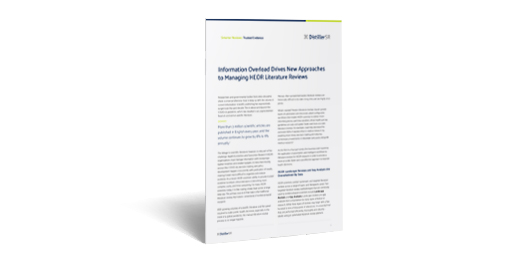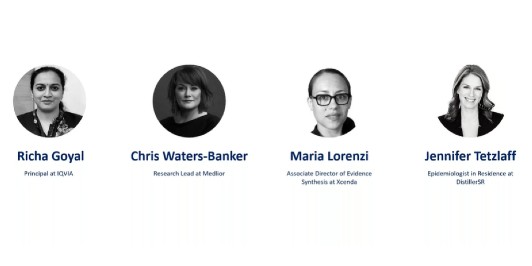Case Study
DistillerSR Enabled Maple Health Group to Improve Efficiency and Optimize Resource AllocationSeeking a solution to overcome increasing volumes of scientific literature and better support literature reviews, Maple Health Group, LLC transformed their processes with DistillerSR to achieve efficiency gains and data-driven insights while improving project planning, resourcing, and client relationships.

Efficient and Accurate Literature Reviews
DistillerSR enabled the automation of the entire literature lifecycle, which not only reduced review times but also minimized human error and enhanced efficiency and accuracy.

Flexible and Customizable Smart Workflows

Transparency and Auditability
Implementing DistillerSR allowed reviewers to have a transparent and auditable method for conducting literature reviews, meeting complex client and regulatory expectations.
Increasing volumes of scientific literature and complex client requirements are constant challenges for consultancy firms. Maple Health Group, LLC, a leading global consulting firm servicing pharmaceutical, biotech, and medical device companies, was searching for new technologies to improve capacity and deliver projects more efficiently.
According to Chris Waters-Banker, Senior Director of Consulting Operations and Konrad Pisarczyk, Scientific Lead in Evidence Synthesis, implementing DistillerSR addressed key challenges related to the dynamic and complex nature of reviewing scientific literature and the volume of evidence involved in literature reviews.
The manual process of reviewing and analyzing scientific literature is increasingly time consuming, resource intensive, and error-prone. As Chris explains, “The biggest challenge for Maple Health Group, and the industry at large, is dealing with the exponential increase in the volume of scientific evidence year after year.”
Clients conducting reviews across multiple topic areas with broader research questions introduce unique challenges as well. According to Chris: “Academic literature reviews are traditionally focused on answering a very focused question and may target a specific type of evidence (e.g., clinical trials). Usually the search output returns very few to no studies fitting the inclusion criteria. Conversely, projects like a global value dossier (GVD) or a health technology assessment (HTA), require you to sift through a higher volume of references to find the most relevant studies while identifying evidence gaps, understanding treatment patterns, highlighting unmet patient needs, and/or supporting a variety of market access activities.”
Finding new ways to add value throughout the process is something the team at Maple Health Group is always striving for, as Chris explains, “In the context of drug review, HTA agencies conduct their own literature reviews so our goal for the submissions we prepare is to conduct an equally or more robust review of the evidence base. HTA and reimbursement processes play a critical role in deciding whether a drug should be recommended for approval and these literature reviews play a crucial role in evidence-based decision-making that can drive potentially life-changing treatments forward.”
DistillerSR’s AI-enabled workflows and evidence management capabilities allowed Maple Health Group to automate the entire literature lifecycle, from collection, screening, assessment, and reporting: thereby reducing overall review times. Implementing smart workflows minimized human error while improving transparency and auditability.
Faster Reviews and Improved Flexibility for the Entire Literature Process
“When dealing with a large volume of evidence, DistillerSR’s AI and natural language processing (NLP) features automatically bring the most relevant titles and papers for screening first,” said Chris. Konrad further explains, “By capturing more of the relevant papers early on, you can start subsequent phases of the review in parallel. It goes beyond improving the efficiency of each phase in sequence, it’s enabling process flexibility at a finer level.”
DistillerSR helps respond to client requests faster, as changes can be applied in real time. “I can set up a form in DistillerSR that includes a yes/no question about the study dealing with a specific population.
Through configurable smart forms and reporting, screening results can be presented early to help clients make informed decisions on projects. Chris outlines: “We can improve the quality of our literature reviews and data collection using DistillerSR-generated reports to identify key differentiating factors related to population, interventions, and outcomes. Studies can often be rather heterogeneous which makes the synthesis or comparative analysis difficult. Forms, labels, and filtering features help us organize the evidence in a meaningful way.”
Greater Transparency and Auditability
Cross-functional Benefits of Implementing AI-Enabled Solutions
Chris has the final word: “We never put our clients into a single mold and force them to operate in a particular way. We use DistillerSR to evaluate the evidence and develop the questions to better understand our clients’ needs. It’s changed the way we think about literature reviews while developing a more strategic approach to meet the research question at hand.”
Download the PDF version of this case study
Related Resources

Business Brief
Information Overload Drives New Approaches to Managing HEOR Literature Reviews

Webinar
How Information Overload is Driving New Approaches for HEOR Systematic Literature Reviews.

Business Brief
Improve Cost-Effectiveness Analysis and Budget Impact Modeling Using Literature Review Automation Software
Learn More About DistillerSR




